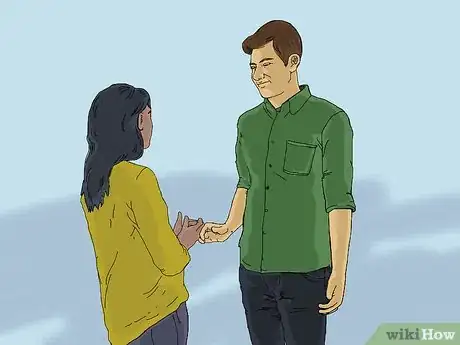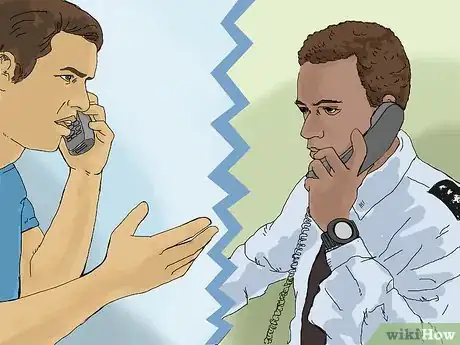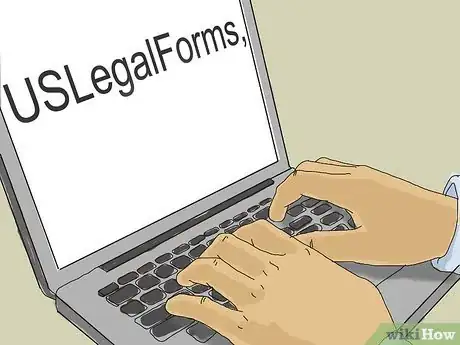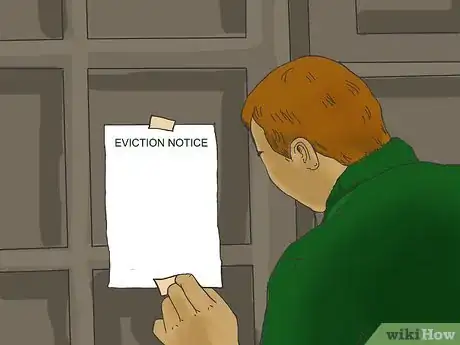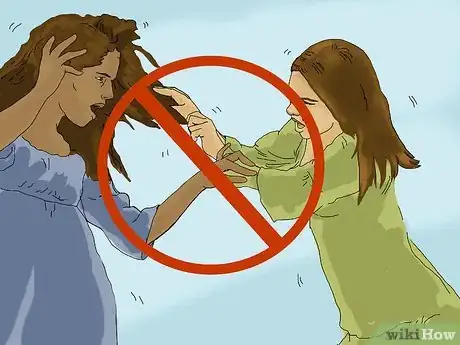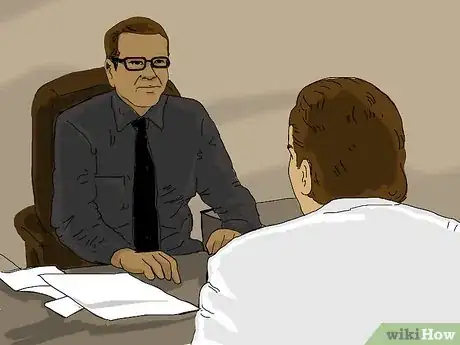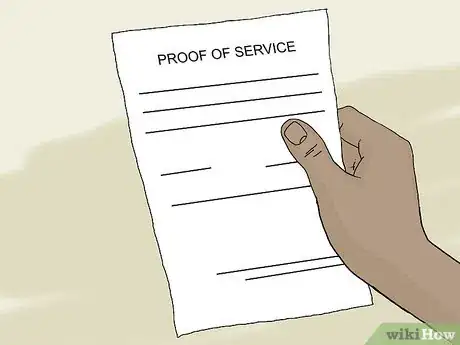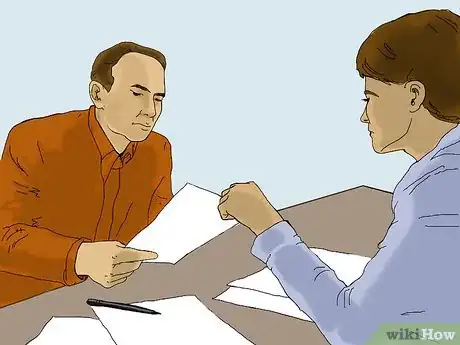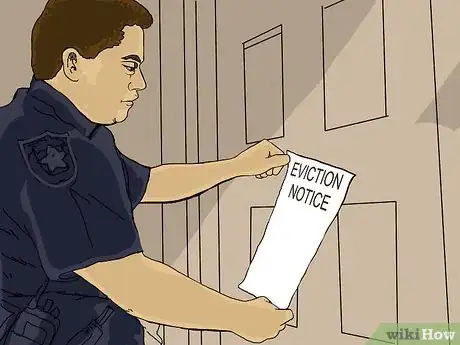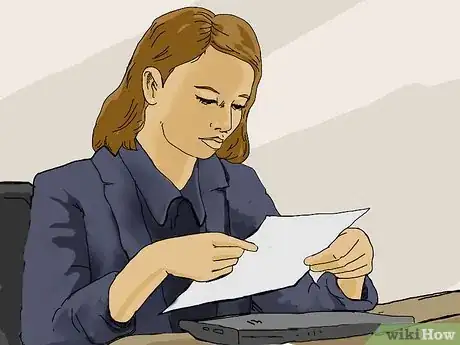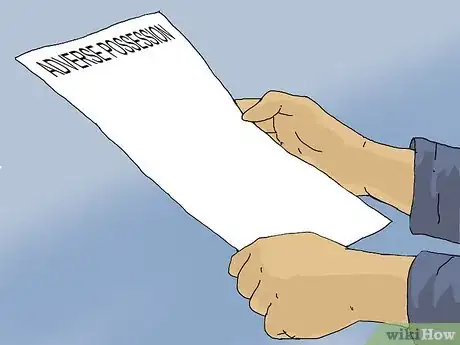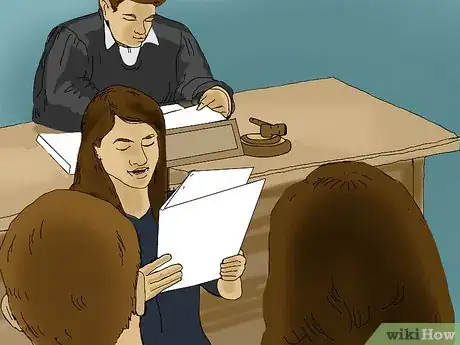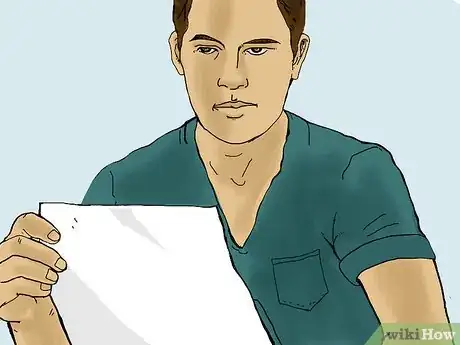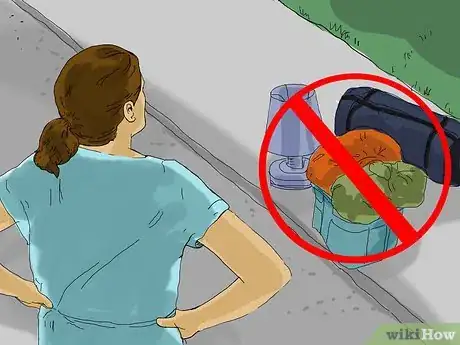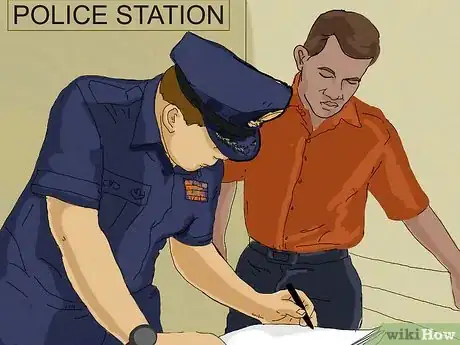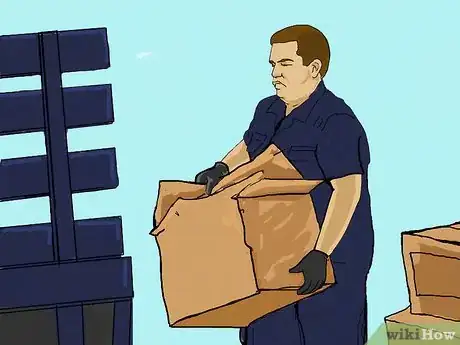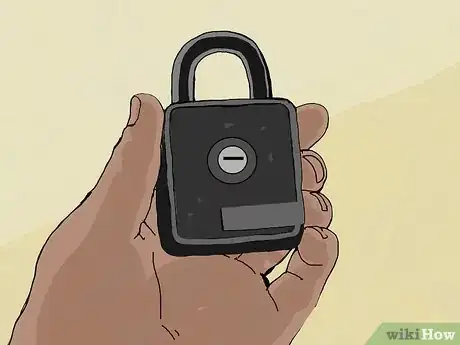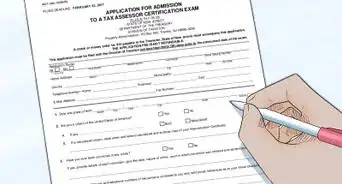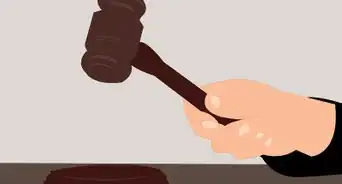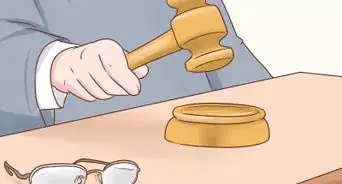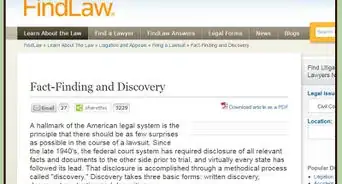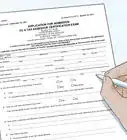This article was co-authored by Lahaina Araneta, JD. Lahaina Araneta, Esq. is an Immigration Attorney for Orange County, California with over 6 years of experience. She received her JD from Loyola Law School in 2012. In law school, she participated in the immigrant justice practicum and served as a volunteer with several nonprofit agencies.
There are 8 references cited in this article, which can be found at the bottom of the page.
This article has been viewed 26,370 times.
It's many property owners' worst nightmare. You visit a building you own only to find squatters living on the premises. No one gave them permission to squat there, and they aren’t in any hurry to leave. Or maybe someone who let the lease lapse refuses to leave. Perhaps they've been evicted and they just won't go. What can you do? After taking a deep breath, you should read your jurisdiction’s laws on evictions and consult with an attorney if necessary. It takes a lot of paperwork to get rid of squatters, but if you stay focused they will soon be out.
Steps
Serving an Eviction Notice
-
1Find out if the people are only trespassing. It’s easier to get rid of trespassers than it is squatters, so find out if the people are really squatters or if they are merely trespassing. If you feel comfortable, you can ask them how long they have been there.
- A trespasser stops at the property temporarily. They occupy a property but make no claim of ownership.
- By contrast, squatters actually move in. They occupy a property under a claim of ownership without the consent of the owner.
-
2Call the police. If you’re uncomfortable or scared of the squatters, then call the police, who can question them. The police can also get rid of trespassers by arresting them.[1]
- You should realize that some squatters are victims of a scam. For example, someone might have pretended to be the owner and drawn up a rental agreement. The person squatting pays rent to this fake landlord under the belief that they are renting a legitimate home. Not every squatter is intentionally trying to steal property out from under you.
- Sometimes police cannot formally remove squatters without a court order. If the case is deemed a civil matter, as opposed to a criminal matter, police may not be able to immediately assist.
Advertisement -
3Draft an eviction notice. If the police won’t remove the squatters, then you will need to serve them an eviction notice. Read your relevant state or local law to find out what information needs to be in the notice.[2] You can also contact a local landlord association. Explain your situation and ask if they can provide you with information about what to include in your notice.
- Some websites, such as USLegalForms, might have a template you can use. However, double-check that the information included in the template is correct and is compliant with your jurisdiction's rules.
- Generally, you need to give the squatters notice to leave the property.
-
4Serve the eviction notice. Your jurisdiction’s law will explain the proper method. Generally, you need to tape it on the door and mail a copy certified mail, return receipt requested to the squatters.[3] Hold onto the receipt and a copy of the letter for your records.
-
5Avoid physically removing the squatters. You have every right to be angry that someone has moved into your property without permission. However, you also can’t legally move someone or threaten to move them. Most jurisdictions prevent you from using any kind of self-help. Doing so can open up your civil and possibly criminal liability.
- Also avoid locking the squatters out of the property or shutting off the utilities.[4] If they’re squatters, you’ll need to take formal legal steps to evict them.
Winning an Unlawful Detainer Lawsuit
-
1Consult with an attorney. The law for dealing with squatters is always changing, and some jurisdictions are making it easier for property owners to evict squatters. You should meet with an attorney to discuss your options, one of which is an unlawful detainer, commonly known as an eviction lawsuit.
- Contact your local bar association referral line. This is a separate service from your state bar office dedicated to providing referrals. Ask for a lawyer who specializes in property law.
- Consider hiring the lawyer. Yes, it will cost money, but you might be feeling overwhelmed, which is only natural. An attorney can make sure you follow the correct procedures for getting rid of the squatters.
-
2File your proof of service. The court wants to see that you served your paperwork properly. For this reason, whoever makes service will fill out a proof of service or affidavit of service and return it to you. File it with the court and keep a copy for your records.[5]
-
3File paperwork with the court. If the squatters won’t voluntarily move after receiving the eviction notice, you’ll need to bring a lawsuit against them. Check to see if you can file your court papers online. If you can't, go to the courthouse in the county where the property is located. Ask if the clerk has any forms to fill out. Tell them you are bringing an unlawful detainer lawsuit, which is the name for an eviction lawsuit.[6]
- If the court doesn’t have forms, then look online or talk to a lawyer.
- You’ll need to pay a filing fee, which will differ depending on where you file. If you can’t afford the filing fee, check to see if a fee waiver is available.
-
4Serve notice of the lawsuit on the squatters. The squatters must be notified about the eviction proceedings. Some courts will send the squatters a summons.[7] However, in other courts, you must arrange service by paying the sheriff or a process server to deliver the papers.
- You can also have someone 18 years older hand deliver the papers if they aren’t a part of the case.[8]
-
5Prepare for court. Your case will be pretty simple: you didn’t rent to the squatters, so they have no right to be living on your property. You can prepare by writing down information about when you discovered the squatters and what steps you took to ask them to leave. Look for deeds to the land, outstanding lease agreements, affidavits, police reports, photos, etc. to submit as evidence.
- Take a copy of your eviction notice with you to court, as well as copies of any other communications you have had with the squatters.
-
6Learn about adverse possession. In common law jurisdictions, squatters might argue that they own the property by adverse possession. Generally, a squatter can obtain title to the property if they are actual, open and notorious, exclusive, adverse, and continuous for the statutory period (which can be anywhere from 5 years to 40 years). Be prepared for the squatters to raise this defense.
- In most jurisdictions, the length of time is quite long—10 years or more.[9] Hopefully, you have discovered the squatters before that much time has passed.
- Depending on where the property is located, the squatter must meet other requirements, such as paying your property tax bill.
-
7Attend your hearing. Give yourself enough time to find parking and pass through courthouse security. In the courtroom, allow your attorney to check in with the bailiff or clerk. When your case is called, you’ll move to the front of the courtroom. You might stand at a desk or directly in front of the judge’s bench.[10]
- Each side can present evidence. Stand quietly when the squatters are speaking and don’t interrupt them.
- Don’t talk over the judge if they have a question, and always call them “Your Honor.”
-
8Receive the judgment. You should receive a decision soon after all evidence has been presented. If you win, you will get a certified copy of the court judgment. Hold onto this, since you might need it to evict the squatters.[11]
- If you lose, you should talk with a lawyer about bringing an appeal. Bring the appeal if you think the judge was completely wrong about the facts or the law.
- You start the appeal process by filing a Notice of Appeal with the court. Ask the court clerk for the correct form, or check for the necessary form online.
Removing the Squatters
-
1Don’t use self-help. Even after winning in court, you still can’t use self-help to evict the squatters. Don’t throw their belongings on the sidewalk, change the locks, or cut off the utilities. If you do, the squatters might sue you.
-
2Visit the police station. Take your court order with you, and show it to the police. The sheriff will schedule a time to come to your property and physically remove the squatters and their belongings.[12]
- You’ll probably have to pay the sheriff to remove the tenant. Ask how much it costs.[13]
- Depending on where you live, you may also have to pay for movers.
-
3Dispose of the squatters’ property. The squatters might take off and leave their things behind. Be careful when handling this property. Your jurisdiction’s law will limit what you can do with the property.[14] Consult with an attorney if you have questions.
- In some jurisdictions, you need to try to contact the squatter and get them to reclaim their property.
- However, in other places, you can simply throw it out or sell it.
-
4Secure your building. Squatters have already broken in once. You need to make sure they don’t get into the property a second time. Check your windows and doors to make sure they are secure, and buy new locks if necessary.
- Also ask neighbors to keep an eye on the property for you. Tell them to alert the police if they see any suspicious activity, such as strange people lurking around the premises. If you are lucky, the police will remove the trespassers before they can become legal squatters.
References
- ↑ https://www.landlordology.com/how-to-get-rid-of-squatters/
- ↑ https://www.landlordology.com/tenant-eviction/
- ↑ https://www.landlordology.com/tenant-eviction/
- ↑ https://www.landlordology.com/how-to-get-rid-of-squatters/
- ↑ http://www.occourts.org/self-help/landlordtenant/filingandserving.html
- ↑ https://www.landlordology.com/how-to-get-rid-of-squatters/
- ↑ https://www.landlordology.com/tenant-eviction/
- ↑ http://www.occourts.org/self-help/landlordtenant/filingandserving.html
- ↑ http://www.nolo.com/legal-encyclopedia/state-state-rules-adverse-possession.html
- ↑ http://www.civillawselfhelpcenter.org/self-help/evictions-housing/evictions/what-to-expect-at-an-eviction-hearing/192-summary-eviction-hearings
- ↑ http://realestate.findlaw.com/landlord-tenant-law/rules-for-landlords-and-property-managers-when-evicting-a-tenant.html
- ↑ http://realestate.findlaw.com/landlord-tenant-law/rules-for-landlords-and-property-managers-when-evicting-a-tenant.html
- ↑ https://www.landlordology.com/how-to-get-rid-of-squatters/
- ↑ https://www.landlordology.com/how-to-get-rid-of-squatters/
